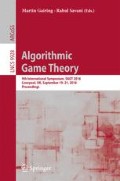Abstract
We consider simple symmetric fractional hedonic games, in which a group of utility maximizing players have hedonic preferences over the players’ set, and wish to be partitioned into clusters so that they are grouped together with players they prefer. Each player either wishes to be in the same cluster with another player (and, hence, values this agent at 1) or is indifferent (and values this player at 0). Given a cluster, the utility of each player is defined as the number of players inside the cluster that are valued at 1 divided by the cluster size, and a player will deviate to another cluster if this leads to higher utility. We are interested in Nash equilibria of such games, where no player has an incentive to unilaterally deviate to another cluster, and we focus on the notion of the price of stability. We present new and improved bounds on the price of stability both for the normal utility function and for a slightly modified one.
Access this chapter
Tax calculation will be finalised at checkout
Purchases are for personal use only
Notes
- 1.
Our upper bounds also hold for disconnected graphs by considering each component separately.
- 2.
In fact, \(|K^1|\) should be either \(\lceil 4(\sqrt{6}+1)\alpha ^2\rceil \) or \(\lfloor 4(\sqrt{6}+1)\alpha ^2 \rfloor \) but the proof still follows in the same way. We set \(|K^1| = 4(\sqrt{6}+1)\alpha ^2\) to keep the presentation cleaner.
References
Anshelevich, E., Dasgupta, A., Kleinberg, J.M., Tardos, E., Wexler, T., Roughgarden, T.: The price of stability for network design with fair cost allocation. SIAM J. Comput. 38(4), 1602–1623 (2008)
Aziz, H., Brandt, F., Harrenstein, P.: Fractional hedonic games. In: Proceedings of the 13th International Conference on Autonomous Agents and Multiagent Systems (AAMAS), pp. 5–12 (2014)
Aziz, H., Brandt, F., Seedig, H.: Computing desirable partitions in additively separable hedonic games. Artif. Intell. 195, 316–334 (2013)
Aziz, H., Gaspers, S., Gudmundsson, J., Mestre, J., Täubig, H.: Welfare maximization in fractional hedonic games. In: Proceedings of the 24th International Joint Conference on Artificial Intelligence (IJCAI), pp. 461–467 (2015)
Aziz, H., Savani, R.: Hedonic games. In: Brandt, F., Conitzer, V., Endriss, U., Lang, J., Procaccia, A. (eds.) Handbook of Computational Social Choice. Cambridge University Press, Cambridge (2016)
Bilò, V., Fanelli, A., Flammini, M., Monaco, G., Moscardelli, L.: Nash stability in fractional hedonic games. In: Liu, T.-Y., Qi, Q., Ye, Y. (eds.) WINE 2014. LNCS, vol. 8877, pp. 486–491. Springer, Heidelberg (2014)
Bilò, V., Fanelli, A., Flammini, M., Monaco, G., Moscardelli, L.: On the price of stability of fractional hedonic games. In: Proceedings of the 14th International Conference on Autonomous Agents and Multiagent Systems (AAMAS), pp. 1239–1247 (2015)
Bloch, F., Diamantoudi, E.: Noncooperative formation of coalitions in hedonic games. Int. J. Game Theory 40(2), 262–280 (2011)
Bogomolnaia, A., Jackson, M.O.: The stability of hedonic coalition structures. Games Econ. Behav. 38(2), 201–230 (2002)
Branzei, S., Larson, K.: Social distance games. In: Proceedings of the 22nd International Joint Conference on Artificial Intelligence (IJCAI), pp. 273–279 (2011)
Brandl, F., Brandt, F., Strobel, M.: Fractional hedonic games: individual and group stability. In: Proceedings of the 14th International Conference on Autonomous Agents and Multi-Agent Systems (AAMAS), pp. 1219–1227 (2015)
Drèze, J.H., Greenberg, J.: Hedonic coalitions: optimality and stability. Econometrica 48(4), 987–1003 (1980)
Elkind, E., Wooldridge, M.: Hedonic coalition nets. In: Proceedings of the 8th International Conference on Autonomous Agents and Multi-Agent Systems (AAMAS), pp. 417–424 (2009)
Feldman, M., Lewin-Eytan, L., Naor, J.: Hedonic clustering games. ACM Trans. Parallel Comput. 2(1), Article 4 (2015)
Furedi, Z.: Graphs without quadrilaterals. J. Comb. Theory, Ser. B 34, 187–190 (1983)
Gairing, M., Savani, S.: Computing stable outcomes in hedonic games. In: Proceedings of the 3rd International Symposium on Algorithmic Game Theory (SAGT), pp. 174–184 (2010)
Kővári, T., Sós, V.T., Turán, P.: On a problem of K. Zarankiewicz. Colloquium Mathematicae 3, 50–57 (1954)
Olsen, M.: Nash stability in additively separable hedonic games and community structures. Theory Comput. Syst. 45(4), 917–925 (2009)
Olsen, M.: On defining and computing communities. In: Proceedings of the 18th Computing: Australasian Theory Symposium (CATS), pp. 97–102 (2012)
Peters, D., Elkind, E.: Simple causes of complexity in hedonic games. In: Proceedings of the 24th International Joint Conference on Artificial Intelligence (IJCAI), pp. 617–623 (2015)
Reiman, I.: Über ein problem von K. Zarankiewicz. Acta Mathematica Academiae Scientiarium Hungaricae 9, 269–278 (1958)
Saad, W., Han, Z., Basar, T., Debbah, M., Hjorungnes, A.: Hedonic coalition formation for distributed task allocation among wireless agents. IEEE Trans. Mob. Comput. 10(9), 1327–1344 (2011)
Author information
Authors and Affiliations
Corresponding author
Editor information
Editors and Affiliations
Rights and permissions
Copyright information
© 2016 Springer-Verlag Berlin Heidelberg
About this paper
Cite this paper
Kaklamanis, C., Kanellopoulos, P., Papaioannou, K. (2016). The Price of Stability of Simple Symmetric Fractional Hedonic Games. In: Gairing, M., Savani, R. (eds) Algorithmic Game Theory. SAGT 2016. Lecture Notes in Computer Science(), vol 9928. Springer, Berlin, Heidelberg. https://doi.org/10.1007/978-3-662-53354-3_18
Download citation
DOI: https://doi.org/10.1007/978-3-662-53354-3_18
Published:
Publisher Name: Springer, Berlin, Heidelberg
Print ISBN: 978-3-662-53353-6
Online ISBN: 978-3-662-53354-3
eBook Packages: Computer ScienceComputer Science (R0)

